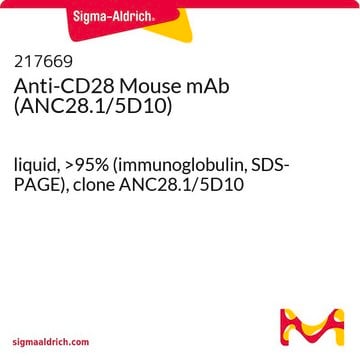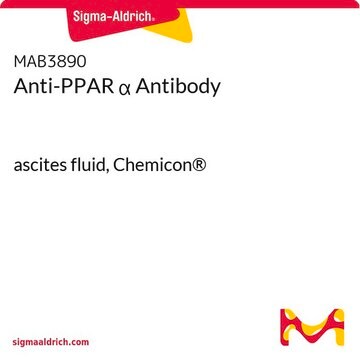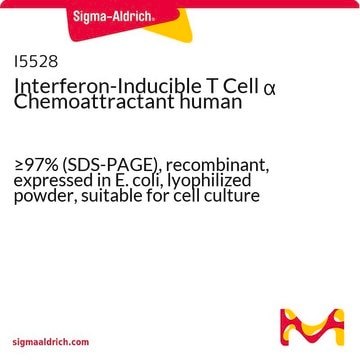CBL517
Anti-CD28 Antibody, clone 15E8
clone 15E8, Chemicon®, from mouse
Sinonimo/i:
Tp44
About This Item
Prodotti consigliati
Origine biologica
mouse
Livello qualitativo
Forma dell’anticorpo
purified antibody
Tipo di anticorpo
primary antibodies
Clone
15E8, monoclonal
Reattività contro le specie
human
Non deve reagire con
canine
Produttore/marchio commerciale
Chemicon®
tecniche
flow cytometry: suitable
Isotipo
IgG1
N° accesso NCBI
N° accesso UniProt
Condizioni di spedizione
wet ice
modifica post-traduzionali bersaglio
unmodified
Informazioni sul gene
human ... CD28(940)
Specificità
FUSION PARTNER: SP2/0
Immunogeno
Applicazioni
Inflammation & Immunology
Immunoglobulins & Immunology
This antibody will act in cell stimulation studies where it has been suggested that measuring T cell function in HIV infected asymptomatic patients may be an early indicator of AIDS, independent of CD4 + cell counts
Optimal working dilutions must be determined by the end user.
Linkage
Stato fisico
Stoccaggio e stabilità
Altre note
Note legali
Esclusione di responsabilità
Not finding the right product?
Try our Motore di ricerca dei prodotti.
Codice della classe di stoccaggio
12 - Non Combustible Liquids
Classe di pericolosità dell'acqua (WGK)
nwg
Punto d’infiammabilità (°F)
Not applicable
Punto d’infiammabilità (°C)
Not applicable
Certificati d'analisi (COA)
Cerca il Certificati d'analisi (COA) digitando il numero di lotto/batch corrispondente. I numeri di lotto o di batch sono stampati sull'etichetta dei prodotti dopo la parola ‘Lotto’ o ‘Batch’.
Possiedi già questo prodotto?
I documenti relativi ai prodotti acquistati recentemente sono disponibili nell’Archivio dei documenti.
Il team dei nostri ricercatori vanta grande esperienza in tutte le aree della ricerca quali Life Science, scienza dei materiali, sintesi chimica, cromatografia, discipline analitiche, ecc..
Contatta l'Assistenza Tecnica.







